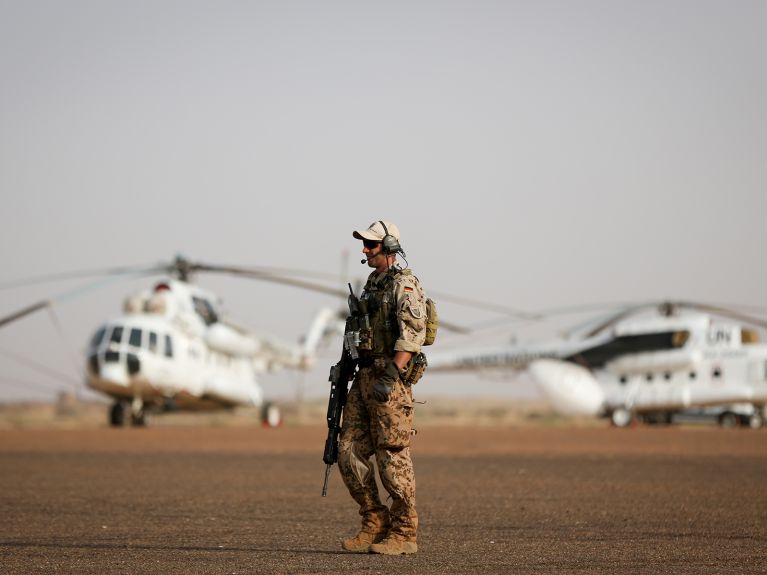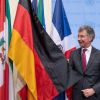Serving for peace
Maintaining peace is a central role of the United Nations. Germany participates in many missions – with soldiers, police officers and civilian personnel.

The United Nations is the world’s largest peacekeeper. Peace missions are a hallmark of the United Nations. According to the UN Charter, the Security Council has the main responsibility for maintaining world peace and international security. It can also mandate a peace mission to realise this responsibility. The international community is then called upon to contribute towards implementing this mission, for example, by providing troops. In many conflict regions, missions of this kind are the only international instrument for protecting people and securing the first steps towards stability.
There are peacekeeping missions that deploy not only military, but also police and civilian personnel. The largest providers of troops come from Africa and Asia. Over 100,000 peacekeepers from 123 countries are currently deployed on 14 peacekeeping missions around the world. The underlying idea is that an impartial, but UN-mandated and multilaterally financed presence in a conflict contributes to reducing tensions, protecting civil society, respect for human rights, securing the delivery of humanitarian assistance and preserving peace. The fundamental principles on which peacekeeping is based include impartiality, non-use of force except in self-defence, implementation of the respective mandate and the consent of the country in which the operation takes place.
Peacekeeping operations agreed by the Security Council are becoming increasingly multidimensional. This means that in addition to traditional “peacekeeping”, such as the military monitoring of a ceasefire or a border, missions today also perform police or civilian functions to promote security and peace. In many crisis situations UN missions work hand in hand with missions of the European Union (EU) or the African Union (AU).
In addition to peacekeeping operations there are also special political missions (SPMs) that are exclusively concerned with civilian conflict management and involve country-specific missions or regional offices. They support the implementation or negotiation of peace agreements, for example, and assist in peace consolidation as well as the prevention of conflicts and support for complex political transitions.
Germany’s involvement in UN peace missions is an important component of German foreign and security policy. At the present time, Germany is contributing personnel to seven peacekeeping missions and two special political missions. Furthermore, Germany is the fourth largest contributor to the budget for peace missions and one of the largest voluntary donors to the UN in the field of crisis prevention and stabilisation. The German Armed Forces United Nations Training Centre in Hammelburg and the Center for International Peace Operations (ZIF) in Berlin, which recruits, trains and supports civilian specialists, are also part of the German effort for world peace within the UN framework.
Germany is participating in the following UN peace missions in spring 2019:
Mali / MINUSMA The largest Bundeswehr operation outside Germany as part of a UN mission is its participation in the Multidimensional Integrated Stabilization Mission in Mali (MINUSMA) with up to 1,100 soldiers. Following the first free elections in 1992, Mali was long regarded as an exemplary democracy in West Africa. However, after a military putsch, armed unrest and the advance of militant Islamists from the north, the country sank into chaos. In mid-2015 the conflict parties signed a peace agreement in Algiers. The UN peace mission aims to support the implementation of the peace agreement concluded between the Government of Mali and the rebels. One of the main emphases here focuses especially on strengthening state structures in the north of the country, protecting the civilian population and contributing to the stabilisation of the areas affected by the conflict.
The Bundeswehr is thus making an important contribution to the restoration of state order in northern Mali and therefore also to peace and stability in the country. This is having direct positive impacts on the stability of the entire Sahel region. The successes are substantial: the ceasefire between the conflict parties is largely holding, it has been possible to improve access to northern Mali and the 2018 presidential elections were relatively peaceful. The German engagement in Mali also pursues a networked approach that combines military participation in the international UN and EU missions, civilian stabilisation projects, development cooperation and humanitarian assistance.
Over 50 nations are participating in the stabilisation mission in Mali with approximately 13,000 Blue Helmet soldiers, 1,500 police officers and civilian personnel. The majority of the German contingent is stationed in Gao (Camp Castor) in northern Mali. However, Germany also provides personnel for the headquarters in Bamako and operates an air transport base in Niamey, the capital of neighbouring Niger. In addition, Germany is engaged in Mali as part of the civilian European Union EUCAP mission and the EU Training Mission (EUTM) in Mali.
Lebanon / UNIFIL The United Nations Interim Force in Lebanon (UNIFIL) is a monitoring mission that has been supporting peace between Lebanon and Israel since 1978. It is one of the oldest active UN monitoring missions and contributes to stability in the region. Its mandate was enhanced in 2006, and the mission was augmented by a Maritime Task Force, which continues to be the only naval component of UN missions. At the beginning of the naval operation, the focus was purely on maritime surveillance. Today, the Lebanese Navy also receives support so that it can secure the country’s maritime border itself. Many Lebanese soldiers have taken part in training modules of German marines. German soldiers are also serving on board a corvette in the Maritime Task Force, at UNIFIL headquarters in Naqura and in a support group on Cyprus. The Bundeswehr has been providing ships and personnel since the beginning of the operation. In March 2019, 125 soldiers from Germany were participating in the mission; the mandate maximum is 300.
Western Sahara / MINURSO The United Nations Mission for the Referendum in Western Sahara (MINURSO) monitors the ceasefire between Morocco and the Polisario Front independence movement. On the basis of a decision by the Federal Cabinet on 16 October 2013, Germany will provide MINURSO with up to four military observers for an unlimited period until the end of the UN mandate. Two are currently serving in Western Sahara. Horst Köhler, Germany’s former Federal President, is also working for a political solution to the conflict as the UN Secretary General’s special envoy for Western Sahara.
South Sudan / UNMISS Founded in 2011, the Republic of South Sudan is the earth’s youngest state. The United Nations Mission in the Republic of South Sudan (UNMISS) aims to protect the civilian population, monitor the human rights situation and secure access to humanitarian assistance. The mandate involves up to 50 German soldiers.
Sudan / UNAMID The United Nations-African Union Hybrid Mission in Darfur (UNAMID) was established jointly by the UN Security Council and the African Union in 2007 to protect the civilian population, facilitate the delivery of humanitarian assistance, mediate between the Government of Sudan and armed movements and provide support in the mediation of community conflict that could have an adverse impact on the security situation. Measures to combat the root causes of such conflict are also being identified in cooperation with the Government of Sudan, the UN country team and civil society. Since 2015, the German mandate has involved up to 50 soldiers and up to 15 police officers.
Libya / UNSMIL The United Nations Support Mission in Libya (UNSMIL) is an integrated political mission that was established in 2011. It has been mandated by the UN Security Council to support mediation within the framework of the Libyan Political Agreement.
Somalia / UNSOM German police officers are supporting peace consolidation and state formation within the framework of the United Nations Assistance Mission in Somalia (UNSOM). They provide strategic policy advice and are involved in training the Somali Police Force. The Federal Cabinet decision of 2015 envisages a maximum deployment of five police officers; three are currently serving in Somalia. The UNSOM police component was again placed under German leadership at the beginning of February 2019.
Haiti / MINUJUSTH Haiti achieved a certain degree of political stability after the peaceful conclusion of elections in February 2017 and the formation of a Government. As a result, the military component of the previous UN mission (MINUSTAH) was concluded and the United Nations Mission for Justice Support in Haiti (MINUJUSTH) established in October 2017. It aims to assist the Government of Haiti in strengthening rule-of-law institutions, to support the Haitian National Police and to monitor observance of human rights. In accordance with a decision of the Federal Cabinet, Germany is participating in this effort with up to 20 police officers.
Kosovo / UNMIK German police officers are participating in the United Nations Interim Administration Mission in Kosovo (UNMIK). Established in 1999, this primarily civilian mission is mandated to help ensure the conditions for a peaceful and normal life for all inhabitants of Kosovo and advance regional stability in the Western Balkans.
You would like to receive regular information about Germany?
Subscribe here:


